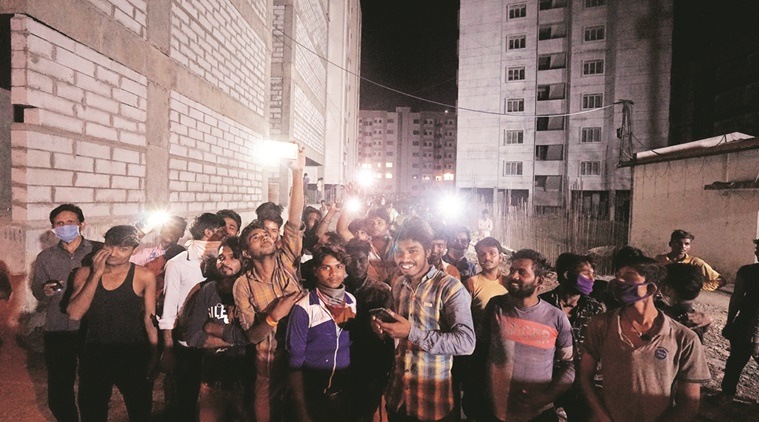 Migrant labourers at a relief camp in Vadodara use their mobile flashlights in response to Prime Minister Narendra Modi’s appeal to show the nation’s “collective resolve and solidarity” in its fight against coronavirus. (Photo by Bhupendra Rana)
Migrant labourers at a relief camp in Vadodara use their mobile flashlights in response to Prime Minister Narendra Modi’s appeal to show the nation’s “collective resolve and solidarity” in its fight against coronavirus. (Photo by Bhupendra Rana)
At 9 pm on Sunday night as residents switched off lights and lit up diyas even as crackers echoed through silence on the eleventh day of lockdown in Vadodara, at a relief camp for migrant labourers on the outskirts, mobile phone torches gleamed through darkness, lighting up faces that masked the sadness of empty stomachs. The initiative was in response to Prime Minister Narendra Modi’s call in the collective fight against COVID-19.
Babloo Chaudhary flashed his mobile phone raising his hand towards the sky, as tears trickled down his cheeks remembering his family over 1,200 kilometres away in Ballia of Uttar Pradesh. He had his a meal at 4 pm in the evening — two puris and gravy — and could not manage to get dinner.
“There was khichdi for dinner but I didn’t get as it got over. I will sleep like that… I wouldn’t mind. I miss my family everyday, but I also stand in solidarity with my country in these hard times. I know we are not the ones who are ill, but indirectly we are the worst affected too,” Chaudhary said.
Working as a driver at a private firm in Dahej, he had left for his hometown on March 27 when he was brought to the relief camp from Golden Chowkdi near Vadodara. He has been out of work since the lockdown with no certainty about his pay.
The 316 people residing at this under-construction building for the Economically Weaker Sections (EWS) by the Vadodara Municipal Corporation (VMC) were brought in after the state sealed its borders and stopped migrant labourers walking home to contain the spread of COVID-19. This was one of the first relief camps set up in the city to house these migrants who had started their journeys from various cities of the state to their native states of Uttar Pradesh, Bihar, Madhya Pradesh and Rajasthan. Police guard the premises.
As majority of them gathered for dinner in the open space within the premises, some flashed their torch from downstairs while a few stood on the balconies. For the first two days, they stayed without electricity.
Two days after, electricity and bulbs were provided, but there are no fans yet.
Seven days later, they were willing to switch off lights and light up diyas. “When I came here, I desperately wanted to go home, I still do. But now we know that we have got to stay here till the lockdown ends. We don’t know what will lighting up diyas do. But we want all of this to come to an end soon. And in support if we have to light up diyas, we will do it,” said Vikas Rawat, another migrant labourer.
On Sunday, after a directive prohibiting distribution of food by individuals and groups in the city, the food that arrived at the relief camp was insufficient for the inmates. While food is provided by various NGOs at least four times a day, on Sunday night many went to bed empty stomach, with hope to resume their journeys back home soon.
Renu Prasad who lives here with 18 other members of her family refused to participate in lighting diyas as her four-year-old daughter and two-year-old son were hungry. “My children couldn’t eat. I have a few packets of biscuits. Will feed them that. I would have participated too. But first I have to think of feeding my children,” Prasad said.